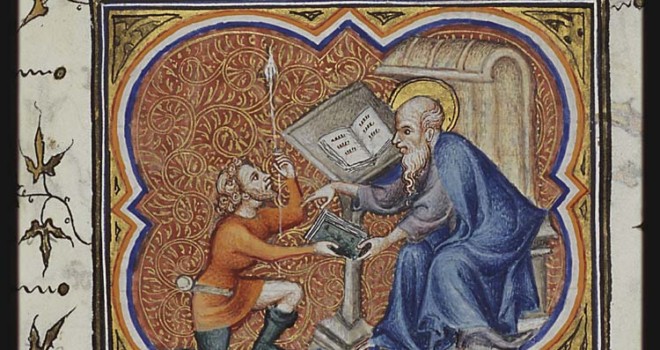Since the inception of Christianity, the life of discipleship has required mentors and friends. Mentors raise up others so that they grow more fully into the discipleship to which they are called. Friends share hopes, joys, and sufferings in communion with those who walk the journey of discipleship. The New Testament, and particularly the letters of St. Paul, remind us of these truths and roles. The Apostle shows us what to look for in a mentor, how to mentor another disciple, and how to live joyfully with true Christian friends.
Three of Paul’s letters are written directly to Timothy and Titus, who looked to him as both mentor and friend. On their feast day, it is fitting for us to examine the contours of Christian mentoring and friendship through the lens of these letters (1 Timothy, 2 Timothy, and Titus). These texts reveal clearly the qualities by which Paul raises up future leaders of the ancient Church and walks with his friends toward holiness and salvation.
One short passage of Paul’s second letter to Timothy (2:14-15), Paul displays his qualities as a mentor, and he provides a wonderful template for building up a current or future leader. In fact, the principles that the Apostle puts forth in this passage works well for secular endeavors as well. Paul begins by teaching Timothy that he should always remind those in his charge to “avoid disputing about words, which does no good, but only ruins the hearers.” Indeed, arguing almost always has the effect of tearing down instead of building up the parties involved, whether in ministry or business or marriage. It is always necessary to employ words that serve to build up the other, even in disagreement. Like Paul, a good mentor will pass along this truth.
In his letter to Titus, Paul also reveals the important choice to give his protege the opportunity to lead and fulfill the given mission. The elder bishop notes that he left the younger bishop in Crete so that the latter might “amend what was defective, and appoint elders” to overcome “insubordinate men, empty talkers and deceivers” (Titus 1:5, 10). Paul follows that fact with an explanation of what the community’s leaders must do to fulfill this mission. He must “teach what befits sound doctrine,” and he is called to help families present a noble witness to the culture around them (Titus 2:1-6).
Finally, Titus is to model the behavior to which he exhorts others: “Show yourself in all respects a model of good deeds, and in your teaching show integrity, gravity, and sound speech that cannot be censured…” (Titus 2:7-8). Paul has entrusted the mission of spreading the Gospel to his protégé; but he knows that Titus still must grow into this role. Good mentors know how to balance those realities.
A mentor also must sometimes admit his flaws and shortcomings. This is specifically so that the one being built up and trained will not make the same mistakes. Early in his first letter to Timothy, Paul gives thanks to God “because he judged me faithful by appointing me to his service, though I formerly blasphemed and persecuted and insulted him” (1:12-13). He goes on to admit that he is “the foremost of sinners” and he has been called to this mission so that the patience and mercy of Jesus may be known through him (1:15-16).
As mentors, it is important that we never present an air of perfection, allowing people to think that we have no flaws or that we have everything figured out. The reality is that we are all learning and growing along the journey. Paul knew this better than anyone, and remained humble because of it.
There is one final, vital lesson on mentorship that we can take from Paul’s relationship with Timothy and Titus. A good mentor keeps the primary mission always at the forefront of his protégé’s mind. Near the end of his first letter to Timothy, Paul writes that godliness, holiness, “holds promise for the present life and also for the life to come” (4:8). Paul wants people to get to heaven! Therefore, Timothy is called to ceaselessly instruct his own flock, nourishing them on the truth of the Gospel, and steering them away from “godless and silly myths” (4:6-7). This is how Timothy and his flock will attain the heavenly reward that they seek. They must be reminded of it constantly, and must remind others, so as to maintain endurance and zeal.
In addition to lessons on mentoring, we learn lessons in real friendship from St. Paul. At the end of his second letter to Timothy (which was among the last of his letters), he exhorts his friend to “come to me soon” (4:9), because has been deserted by others. Paul knows Timothy’s Christian charity, and he knows that he can count on this man when he could not count on others. Each of us needs to consider which of our friendly relationships exhibit that same faithful quality.
Paul’s relationship with Timothy was exceptional, and we see the fullness of it in the second letter. We see this especially in the fact that Paul and Timothy would suffer together in friendship. Paul writes to his friend, “Do not be ashamed…but take your share of suffering for the gospel” (2 Tim. 1:8). Paul goes on to tell Timothy that he is not ashamed to suffer, and that the younger bishop should imitate “the pattern of the sound words which you have heard from me” (2 Tim. 1:13). When friends know each other (their missions and tendencies) deeply, they come to empathize with the other, to share in the life of the other, including the painful parts. In the example of Paul and Timothy, we learn that the deepest definition of friendship includes a willingness to share the pain and agony of the other.
As we celebrate the feast days of St. Paul (Jan. 25) and Sts. Timothy and Titus (Jan. 26), we should honor them by seeking to share the graces that they shared. We should desire to find good mentors, to be good mentors, and to live authentic friendship. These people, mentors and friends, will help us live out our faith, walking the Christian journey with us, even in difficult times. They will share our hopes, joys, and sufferings at every step along the way. If we don’t already have these people, we must begin praying to God to place them in our lives.












